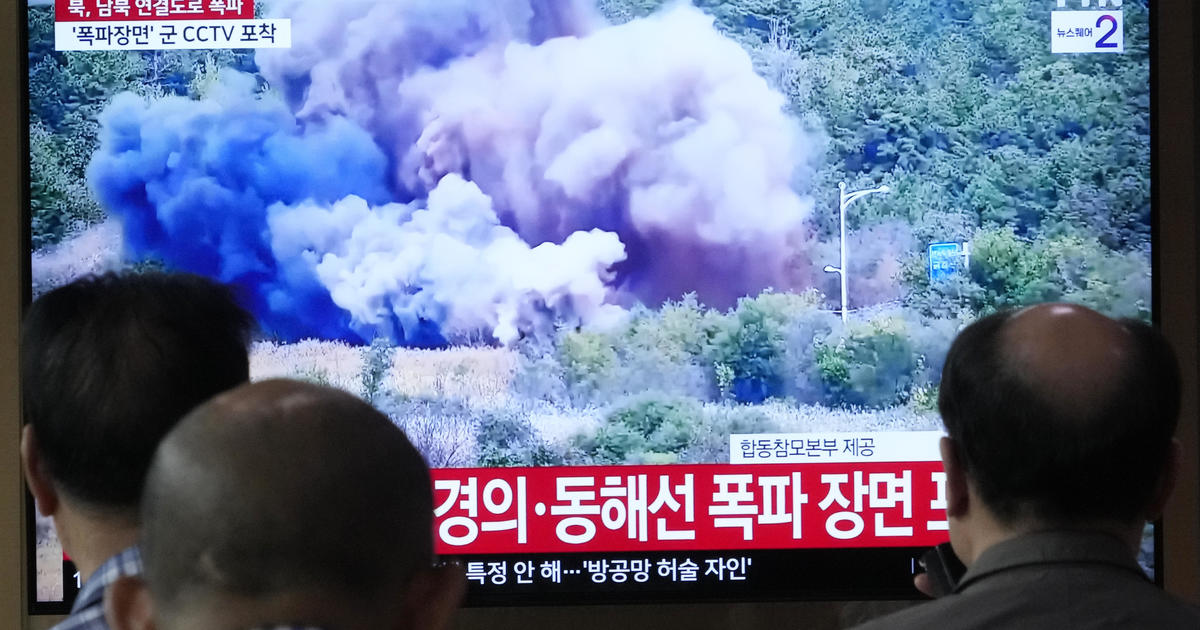The escalating tensions between North and South Korea reached a new peak with North Korea’s symbolic demolition of inter-Korean roads. This act, viewed as a clear demonstration of anger and disdain towards South Korea’s current government, marks a significant deterioration in inter-Korean relations. The demolition follows accusations by North Korea that South Korean drones infiltrated its airspace, prompting threats of retaliatory action and a hardening of stances on both sides. This incident highlights the volatile nature of the Korean Peninsula and the significant challenges in achieving lasting peace and reconciliation.
North Korea’s Demolitions: A Symbolic Gesture of Anger
The demolition of the inter-Korean roads serves as a powerful symbolic gesture illustrating North Korea’s growing hostility towards South Korea’s conservative government. This act is not simply a destruction of infrastructure; it represents a calculated move to sever ties, abandon the pursuit of peaceful reunification, and escalate tensions on the Korean peninsula. North Korea’s justification for the demolition centers on its accusation that South Korean drones violated its airspace, fueling already high tensions.
The Symbolic Significance of the Act
The choice of roads as targets is not accidental. These routes were previously symbols of inter-Korean cooperation and symbolized hopes for a unified future. Their destruction sends a strong message, reversing years of tentative progress toward reconciliation and highlighting the deep distrust between the two nations.
International Condemnation and Response
The demolition has drawn strong condemnation from South Korea’s Unification Ministry, which called the act “highly abnormal” and “regressive.” South Korea’s military responded by firing warning shots, although it remains unclear whether North Korea reciprocated. The international community also expressed concern over the escalating tensions, further highlighting the need for diplomatic solutions.
Escalating Tensions and the Threat of Further Escalation
The demolition of the roads is only one facet of the escalating tensions between North and South Korea. The drone incursions, while not yet confirmed by South Korea, are being used by North Korea to justify its increasingly aggressive actions. North Korea’s claims and the subsequent threats of military action illustrate the volatile nature of the relationship and potential risks for further escalation.
The Role of Propaganda and Misinformation
The narrative surrounding the drone incident highlights the pervasive use of propaganda and misinformation in escalating tensions between the two countries. Accusations and counter-accusations, often unsupported by verifiable evidence, create a climate of fear and mistrust that complicates attempts at diplomatic engagement.
The Potential for Further Military Action
While analysts suggest a full-scale invasion is unlikely given the disparity in military power, the heightened state of alert on both sides increases the risk of accidental or miscalculated escalation. The mobilization of North Korean military units adds further fuel to concerns of wider military confrontation.
Historical Precedent and Kim Jong Un’s Shifting Policy
North Korea has a history of using acts of destruction as political statements. The demolition of the inter-Korean liaison office in 2020 and the destruction of tunnels at its nuclear testing site in 2018 serve as stark examples of this tactic. Kim Jong Un’s recent pronouncements regarding the elimination of the goal of peaceful reunification and the labeling of South Korea as the “invariable principal enemy” further underline a shift toward heightened aggression.
The Shift Away from Peaceful Unification
This significant shift in policy represents a departure from the prior emphasis on eventual reunification, at least on the stated policy of the leadership of North Korea. Experts suggest this is part of a broader strategy to leverage the regional power dynamics, consolidate Kim Jong Un’s leadership internally, and diminish the influence of South Korea regionally.
Potential Reasons Behind the Shift in Stance
The underlying reasons behind Kim Jong Un’s increasingly bellicose posture are likely multi-faceted. The aim might include weakening South Korea’s voice in negotiations, encouraging direct dialogue with the U.S., limiting South Korean cultural influence in North Korea and consolidating his power base at home.
Implications for Regional Stability and the Path Forward
The recent developments significantly increase tensions on the Korean Peninsula and threaten regional stability. The breakdown in communication and cooperation raises concerns about the possibility of further military escalation. This necessitates an immediate call for diplomacy to de-escalate the crisis and prevent further escalation.
The Urgent Need for De-escalation and Dialogue
While a large scale military conflict may remain unlikely, the increased risk of smaller, accidental conflicts calls for an urgent intervention and initiative toward de-escalation of tensions and for open communication channels between North and South Korea to prevent further conflict. The role of the international community is pivotal in supporting mediation efforts and pushing for a diplomatic solution to defuse the crisis and restore communication between both states.
The Challenges of Finding a Resolution
Achieving a lasting solution will require addressing the fundamental underlying issues of distrust and security concerns, which has plagued inter-Korean relations for decades. Finding an agreeable approach that addresses North Korea’s concerns about security and sovereignty alongside a path towards denuclearization remains a significant challenge.
Takeaway Points:
- North Korea’s demolition of inter-Korean roads represents a significant escalation of tensions on the Korean Peninsula.
- The act underscores North Korea’s growing hostility towards South Korea and a departure from past attempts at reconciliation.
- The incident highlights the volatile security situation on the Korean Peninsula and increased risks for miscalculation and escalation.
- The international community must work to de-escalate tensions and foster a return to dialogue between North and South Korea.
- Addressing the underlying causes of the conflict, including security concerns and denuclearization, remains critical to achieving a lasting resolution.









